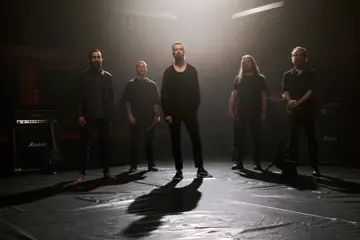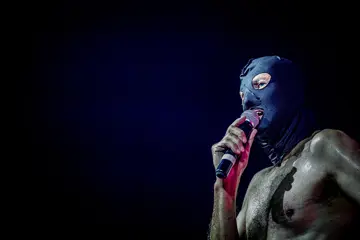As I flip through the Sound As Ever book, a new song by the mighty Brisbane band Halfway is playing. It’s called 1994.
“The song explores a point in time which is remembered differently by the people who were there,” explains singer John Busby.
In February 2020, just before Covid kicked in, Jane Gazzo and Scott Thurling launched a Facebook page celebrating Australian indie music from the ’90s. They called it Sound As Ever, after You Am I’s 1993 debut album.
Within days, the page had thousands of members. And then during lockdown, the number swelled to more than 18,000, as people found comfort in sharing their memories of the decade when Ben Lee was “a precocious little cunt” (according to Bernard Fanning).
The Sound As Ever page has morphed into compilations, T-shirts, gigs and now a book.
Appropriately, Tim Rogers contributes the prologue. “That I’ve been resistant to talk about ‘the ’90s’ as being a particularly fecund period for great music says more about regret than anything else,” he writes. “Regret that I wasn’t more grateful. I had the opportunity to witness performances, recordings and interactions that now appear climactic, dramatic. At the time I just dug my chin into my corduroy and pulled my shoulders up. It was the decade of the shrug.”
Don't miss a beat with our FREE daily newsletter
Gazzo and her co-author Andrew P Street have done a fine job collating a kaleidoscope of memories from the decade of flannelette shirts, nose rings, Brashs and Blundstones, complete with some truly great photos by the era’s best rock photographer, Tony Mott.
Gazzo wanted it to be a scrapbook, like an old Smash Hits annual, but celebrating not just a year but an entire decade – “the greatest decade in Australian music”, according to the authors (debatable, depending on when you were born, or if you scan the decade’s highest-selling Australian singles, bookended by Craig McLachlan’s Mona in 1990 and Madison Avenue’s Don’t Call Me Baby in 1999).
Gazzo introduces the book: “In every decade, there will always be good music and great moments. But will it ever be this good?”
Smudge drummer Alison Galloway (who was immortalised in the Lemonheads’ Alison’s Starting To Happen) reflects: “Whenever I look back at those days, I just feel so incredibly lucky. What a time to be alive! I’m not even sure how it all happened … everything just seemed to fall into place. But maybe everyone thinks that about their youth?”
It was certainly a time of change. The VFL became the AFL. Rugby league endured the Super League war. We said goodbye to afternoon newspapers. We welcomed our first female premiers, with Carmen Lawrence in WA and Joan Kirner in Victoria. And Nirvana slayed the hair rock bands. As Henry Rollins remarked, “They shot the top off the poodles. All those bands became like rusty tanks in the desert with no more gas.”
Street remembers the often-forgotten Ratcat, “the first proper rock stars of the ’90s”, and the book highlights some gems that are rarely heard these days, songs such as Ammonia’s You’re Not The Only One Who Feels This Way, Caligula’s I.C.U, Pollyanna’s Lemonsuck and the Falling Joys’ Lock It – “the person I wrote it about never knew it was about them,” Suzie Higgie reveals.
Every reader will have their own visceral reaction to the book – and complain if their favourite band is not mentioned (where’s Fini Scad?). But the book doesn’t pretend to be a bible. It’s more like a terrific time capsule, filled with random objects that remind you of the glory days before Facebook, Spotify and TikTok.
The Big Day Out is rightly celebrated, while the late-great music journalist Anthony Horan praises 1995’s Alternative Nation, “a glorious mess”.
“I’m not sure why it is constantly referred to as a ‘flop’ when it’s so fondly remembered by those who were there, for a whole bunch of different reasons,” writes Horan of the ill-fated festival that featured a range of Aussie acts, including Powderfinger and Horsehead, among the international headliners.
An unwritten but underlying theme of the book is timing and luck. Some bands remain household names (You Am I, Spiderbait), others burned brightly before burning out (Ratcat, Ammonia), while some didn’t get the success they deserved (Glide, Automatic, Sandpit).
Kevin Mitchell became a star in the ’90s, fronting Perth band Jebediah. Later, as Bob Evans, he “played around with nostalgia as a sentiment for songs”. So how does Mitchell look back at the ’90s?
“I think the ’90s will always be broadly interesting because the internet and everything like that started to happen at the end of the ’90s,” he told The Music. “I think we can all agree the internet is one of the biggest things to have changed society in our history, like industrialisation. So, the ’90s is like that last little time before the world really changed.
“I guess there’s a sense of innocence about it that I miss. It’s a cliché, but life really was simpler. The society we’ve created for ourselves just becomes more and more complicated.”
In the ’70s, Skyhooks declared that ego is not a dirty word. But in the post-Nirvana world, false modesty had become a mantra. Bands still wanted to become rich rock stars, they just didn’t admit it. Ambition had become a dirty word. It was the decade of feigned indifference.
Record companies were desperately trying to market music to a generation that didn’t want to be marketed to. Hence, the majors started “indie” offshoots, like Sony’s Murmur label, which signed silverchair, Something For Kate and Ammonia.
We didn’t know it at the time, but the ’90s were also the dying days of the “record company bidding wars”. Gazzo remembers Killing Time/Mantissa, as well as Geelong band Automatic, who received a huge package from one major label. “Sign with us,” the note said, “and we’ll give you everything including …” Yep, the package contained a kitchen sink. Gazzo believes the sink ended up at the tip, which probably says something about how the ’90s turned out after promising so much.
One of the decade’s great lost talents, Tania Lacy, writes about the Countdown Revolution “revolution”, when she and co-host Mark Little staged an on-air “strike”, complaining that the bands were miming and the hosts were just “mouth-pieces to sell records”. The duo was fired by fax. “My career fell into a deep hole and never truly recovered,” Lacy reveals. “And those rebellious ‘executives’ who loved to talk about their defiant days on the original Countdown, well, turns out they actually like people to play by the rules.”
Gazzo, of course, had her own TV career during the ’90s, co-hosting the era’s seminal music show, Recovery. She also fronted the pop band Rubher, who recorded two EPs, toured with the Falling Joys and were better than Gazzo’s own description: “a fairly unremarkable indie pop outfit”.
A self-confessed hoarder, Gazzo lovingly reproduces letters, postcards, gig posters, flyers, set lists and record company promo shots, and admits she has a framed photo of the much-missed Melbourne venue the Punters Club on her wall.
A highlight is a letter from Bruce Ruxton, the Victorian RSL president, complaining about TISM’s 1998 CD I Might Be A Cunt, But I’m Not A Fucking Cunt. “I suppose for some it may be okay,” Ruxton writes, “but it seems that the standards in this country are dropping through the floor into the proverbial sewer.”
From the “sewer” of the ’90s, Sound As Ever have crafted a glorious celebration, a book that’s like the decade’s most-quoted movie line – Forrest Gump’s box of chocolates – you never know what you’re gonna get as you turn the pages.
And I couldn’t help but ponder: What will a book celebrating the 2010s feature? Emails and tweets?
“I look back to the late ’90s as a time when me and the other Jebediah guys were pretty happy-go-lucky, we were just riding this wave,” Kevin Mitchell notes. “I’d probably suggest to my younger self to pay attention, make sure you don’t miss anything, because it’s all going to be over pretty soon and you don’t want to have any regrets.”
As Matthew Sweet said, nothing lasts. And everyone grows up.
Andrew P Street, who is now a speechwriter for the South Australian Premier, reflects on the decade: “It was a golden time, but there’s still gold to be found.”
Of course, many of the people now shaping our music scene weren’t even born in the ’90s. For some of them, much of this book will read like it’s almost in a foreign language. But as Halfway’s John Busby points out, it was a pivotal time “for a particular group of people, involving death, loss, friendship, and optimism for the future.
“For others, their memories of this time have morphed and changed – sometimes for the better, and sometimes for the worst.”
Sound As Ever is out now (Melbourne Books)















